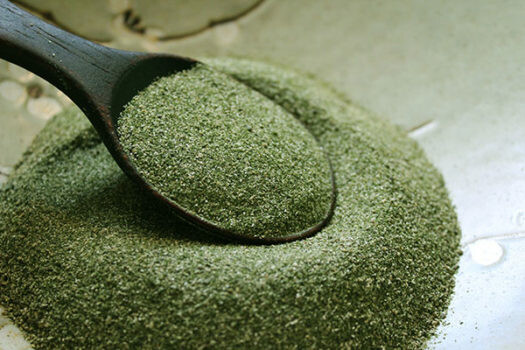
Kelp is an excellent mineral supplement. Everyone today is low in minerals, due to modern agricultural methods, depleted soils, food processing, weak digestion, and perhaps other reasons.
Kelp is well-known as an excellent source of most of the important trace minerals. There are a few such sources anywhere on earth. It is loaded with chlorophyll, fiber and minerals, including significant amounts of sodium, potassium, calcium, magnesium, chromium, copper, lithium, manganese, selenium, vanadium, sulfur, and iodine calcium, phosphorus, iron, B-vitamins and many other trace minerals naturally found in the ocean.
Besides the well-known trace elements such as copper, zinc, manganese, chromium, and others, kelp supplies many of the ultra-trace minerals such as germanium, iridium, rubidium and others of which we know much less. However, they may be very important for human health, especially today when the food and the soils have become very depleted.
Health Benefits
- Kelp is a really good source of iodine, which many believe the majority of the population is deficient in. Despite what Western medicine tells us, limiting our intake of iodized salt has actually resulted in compounding the onset of many diseases and conditions. Iodine is extremely important for the endocrine system and is needed to produce thyroid hormones. Iodine is also necessary for the adrenal glands ovaries, breast tissue, prostate gland and the entire hormone system of the body. Iodine supplementation has a remarkable effect on the toxic metals in the body and can help remove toxic chemicals and infections.
- Kelp is rich in iron, calcium, magnesium, with some zinc and selenium, but low in copper. This is quite a good blend of minerals and one of the main reasons why we prefer kelp to other “minerals supplements.” Most people need the extra minerals desperately.
- Kelp provides readily available calcium. Many products contain calcium, however, kelp, carrots, carrot juice, sardines and raw dairy contain the best forms of calcium we need today. The calcium found in pasteurized and homogenized dairy, in seeds and nuts, and in a few other foods is not as well utilized by most people.
- Bioavailable iodine is kelp’s best-known advantage. Iodine belongs to the halogen family of elements, along with bromine, chlorine, and fluorides. However, those are considered iodine antagonists that interfere with our iodine uptake and utilization, causing widespread thyroid problems and many other health problems. Fish and seafood are other good sources of bioavailable iodine. However, they are too high in mercury to be regularly eaten Iodized salt provides some iodine, but is not enough, in almost all cases. Also, the iodine in salt is not that well utilized by some people.
- The lignans in kelp can inhibit angiogenesis, the process by which cancer cells metastasize. The lignans also inhibit estrogen synthesis in fat cells and reduce the 4OH and 16OH metabolites that are considered a significant risk factor for breast cancer. Kelp is also rich in folate, a B vitamin that can significantly reduce the likelihood of colon cancer.
- High level of iodine, especially in the form of T3 and T4 as in Laminaria digitata kelp, support thyroid health and protects the thyroid from radiation exposure.
- The folate in kelp helps break down homocysteine, a dangerous metabolic byproduct. Homocysteine can directly damage blood vessel walls, and high levels are associated with a significantly increased risk of cardiovascular disease and stroke. Kelp is also a very good source of magnesium, which has also been shown to reduce high blood pressure and prevent a heart
- Kelp is a source of fucans, carbohydrates that can reduce inflammation.
One simple way to determine if you are deficient in iodine is to conduct a simple experiment. Using a 2% brown iodine tincture, paint a 2-3” square on the forearm, belly or thigh. Then observe over the next 24 hours to see how fast it disappears. The faster the iodine is absorbed is an indication of how deficient your body is in this element. NOTE: if have been diagnosed with Hashimoto’s disease or have a known allergic reaction to iodine, fish or other seafood, this test is not advised.
Kelp as a supplement is highly recommended since every cell in the body utilizes the trace minerals it supplies in some form. I recommend the supplement from Endomet Labs, because of the high-quality of products they produce. Their product line of vitamin and mineral supplements is specially formulated to match your specific bioindividuality and the raw materials used are analyzed and certified to meet specific quality and potency guidelines.
The best way to determine the specific supplements your body needs is through a hair mineral analysis. schedule a complimentary call for more information.
Disclaimer: The information contained herein is not to be construed as medical advice and is not intended to diagnose, treat, or cure any medical condition. These statements made have not been approved by the FDA, nor should they be taken as a substitute for medical advice from a licensed physician.
Affiliate Links: Some links on my website and emails are affiliate links. Should you click on these links and decide to purchase anything, I will receive a small commission and you will have my sincere thanks for supporting Tina’s Healthy Living.











